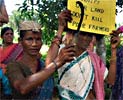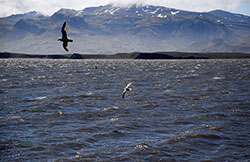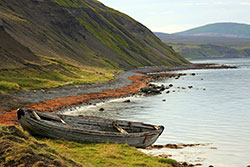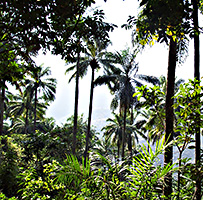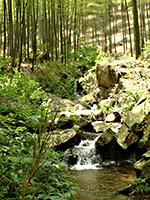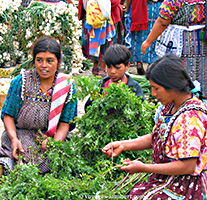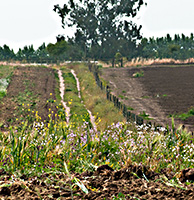A small village near a fjord in Iceland – 1921
The founding of a union
“Dear fellows, that's why we’re founding a union tonight!” The thin young man from Reykjavik in his wrinkled grey suit looks around the village hall with blazing eyes. “Poverty has to end now. Why should you be hungry, why are small children dying here like flies? It is because shipowner Bogesen is underpaying you. You catch the fish, you are at risk of drowning at sea, the women are working till they burst at the fish cleaning company, and who is getting away with the profit? Bogesen.”
Salka Valka, a young fisherwoman, is listening attentively. That man is right. Bogesen is rich, and the fishing families are dirt-poor. How nicely he explains everything. At the same time he is learned and inspired, the sparks are flying. What a beautiful world is there for the taking!
“In Russia the proletarians have expelled the capitalists and their mercenaries. Now they are building a new society there, with beautiful enterprises from the workers themselves, with hospitals and libraries. At last the workers get nice houses with running water and electricity. Peoples’ sports halls and peoples’ culture centres are springing up there.”
Salka Valka wakes up from her dreams. Suddenly she is the down-to-earth everyday fisherwoman. She stands up and says, “I want to ask you a question. You talk about wage increase, but Bogesen has said that he will never accept that. He will never give in to a strike. What will we do then, when no one of us has an income, when there is no money to buy food? Bogesen can hold out for a long time, he has plenty of money. But we fishermen can't.”
Once Salka Valka has started talking, she cannot stop any more. “Please, stop these dream stories about running water and electricity. Earlier we had here the Salvation Army; they told us that singing psalms and shouting 'hallelujah' would solve all our problems. And now you bother us with strike and revolution, which will resolve all our troubles. But here, we are fishermen. We are dependent on fish. Words are cheap, but we can't use these hazy dreams.”
“Let him go to Russia, that troublemaker,” someone calls from the back of the hall. “Death to the capitalists and their servants,” sounds from another side. Someone hits another, and the other one hits back. There is pushing and pulling, shouting and cursing. The activist from the capital squeezes himself out of the hall. The same evening a union is founded on the field in front of the village hall.
_______________________
Source
O Thou Pure Vine (1931) and The Bird on the Beach (1932) are two splendid novels written by the Icelandic author Halldór Laxness about the hard life of small fishermen, and are at the same time a touching love story.
Go to:
= the next page:
Rich for a few years - a remote farm in the marshlands of Iceland – 1922 (3), story 72.
= the Table of contents, story 71.
